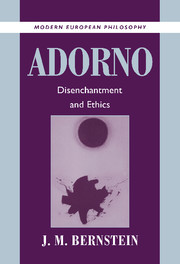Book contents
- Frontmatter
- Contents
- Preface
- List of Abbreviations
- Introduction
- 1 “Wrong Life Cannot Be Lived Rightly”
- 2 Disenchantment: The Skepticism of Enlightened Reason
- 3 The Instrumentality of Moral Reason
- 4 Mastered by Nature: Abstraction, Independence, and the Simple Concept
- 5 Interlude: Three Versions of Modernity
- 6 Disenchanting Identity: The Complex Concept
- 7 Toward an Ethic of Nonidentity
- 8 “After Auschwitz”
- 9 Ethical Modernism
- Index
9 - Ethical Modernism
Published online by Cambridge University Press: 05 June 2012
- Frontmatter
- Contents
- Preface
- List of Abbreviations
- Introduction
- 1 “Wrong Life Cannot Be Lived Rightly”
- 2 Disenchantment: The Skepticism of Enlightened Reason
- 3 The Instrumentality of Moral Reason
- 4 Mastered by Nature: Abstraction, Independence, and the Simple Concept
- 5 Interlude: Three Versions of Modernity
- 6 Disenchanting Identity: The Complex Concept
- 7 Toward an Ethic of Nonidentity
- 8 “After Auschwitz”
- 9 Ethical Modernism
- Index
Summary
Introduction
If the inference from Auschwitz, understood in terms of a negative theodicy, to the new categorical imperative is sound, it nonetheless falls well short of demonstrating, even in principle, that a wholly secular form of life can be rationally compelling and intrinsically motivating. The eschatological destruction of meaning in Auschwitz casts a shadow over the new imperative which can only say “never again!” to it. Even if we could conceive of arranging our thoughts and actions in a manner ensuring that Auschwitz would not be repeated, and it remains quite unclear what in detail this would amount to, how we could ensure this without utterly transforming our present form of life, even so there is no obvious reason to believe that the virtuous lives of individuals corresponding to such an arrangement would be happy, satisfying, meaningful. Thus one can say either that the new, contextually defined imperative on its own because negatively constructed is so indeterminate about what a form of life resistant to a repetition of Auschwitz would look like that its satisfaction would require the depiction of a new form of life, or, more simply, that the new imperative shares the meaning deficit of all negative versions of moral principles: “It heeds the prohibition of graven images, refrains from positive depiction, and … refers negatively to damaged life instead of pointing affirmatively to the good life.”
- Type
- Chapter
- Information
- AdornoDisenchantment and Ethics, pp. 415 - 456Publisher: Cambridge University PressPrint publication year: 2001

